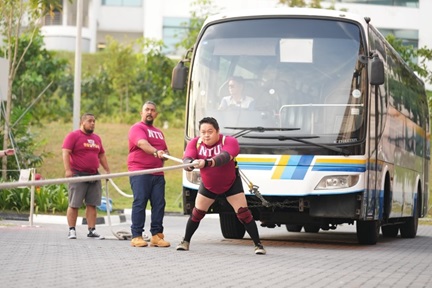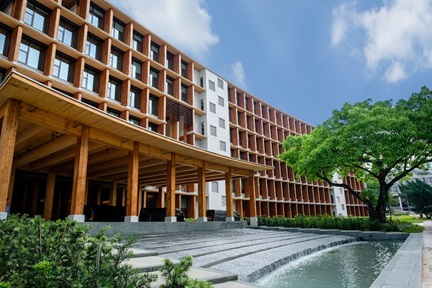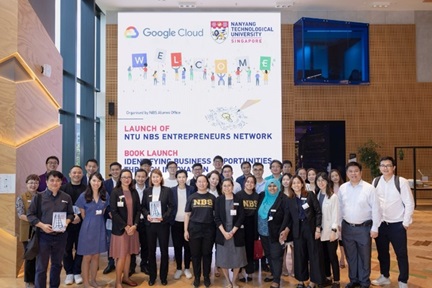More can be done to tackle hidden gender biases and break down stereotypes: Indranee
NBS Dean Prof Christina Soh hosted the dialogue with Ms Indranee, who covered a range of topics from women in leadership and breaking down gender stereotypes to the under representation of women in certain fields
As a young lawyer just starting out, Ms Indranee Rajah was told that women should do more corporate and conveyancing law, and that men are more suited for litigation as the field is "tough".
Yet, she went on to become a leading litigation lawyer and was appointed Senior Counsel in 2003.
"It was not malicious, but it was just a kind of unspoken assumption that women would do corporate and conveyancing work which is not contentious, and that they wouldn't do litigation," she said on Wednesday (March 30).
"When I was in university, I was doing moots, and international moots means you're basically doing mock litigation, so that got me one foot in the door and nobody really questioned it.
"So when I had the opportunity to be part of the recruitment process, that was something I worked very hard to change," said Ms Indranee, Minister in the Prime Minister's Office, who was speaking at Nanyang Business School International Women's Day Forum 2022 held at Nanyang Technological University.
More needs to be done to address such implicit assumptions - whether at the workplace or at home, she said.
Her comments come a few days after the Government released on Monday (March 28) a White Paper with plans to improve the lives of women in a range of areas, from flexible workplace arrangements to caregiving.
In response to a question on how men can help, Ms Indranee said they can start by relooking hidden biases.
"Give women a chance and try them out. And some of them will really fly, which is great, and some may not. And for those who don't work out, don't take that as evidence that women can't do the job.
"You should take that as evidence that a particular individual is not suited for that particular role, just as there will be guys who are not suited for particular roles.
"So, in each case, you've got to look at the individual, give them their due credit, and try to help them to really blossom in the various areas," she added.
About 250 participants tuned into Wednesday's forum, which was held in a hybrid format.
Nanyang Business School dean Christina Soh hosted the dialogue with Ms Indranee, who covered a range of topics, from women in leadership and breaking down gender stereotypes, to the under-representation of women in fields such as science, technology, engineering and mathematics. More On This Topic Egg freezing, more flexi-work among policy changes in White Paper on S'pore women Time for women to serve NS and challenge outmoded gender norms
The recent White Paper aims to tackle some of the common assumptions that women deal with, said Ms Indranee. One such assumption, she added, is that "women should be the ones to take care of children, take care of family, and that puts a lot of pressure on them".
"And they're often put in a situation where they have to make a binary choice... and when you force them to do that, many of them will choose family because they see that as a very important thing.
"That assumption needs to change. And to be fair, it has been changing. We do see many more fathers, many more men stepping up to help with the family. But there's a lot more that can be done."
Making a societal shift starts at home, said Ms Indranee, citing the example of her mother who worked as a nurse while raising three children.
"I grew up with a role model in mind of a mother who worked and looked after family. So it never ever occurred to me that I couldn't do both.
"And my mother never ever said that you can only do certain subjects or only do certain things. And to the extent that we could afford stuff, she would let me have them or do it. She didn't limit me and that was very important."
Those in teaching or mentoring roles must help boys and girls understand their shared and equal roles in society from young, instead of reinforcing stereotypes, said Ms Indranee.
She also acknowledged the pressures put on women to "have it all", and do well in both work and family responsibilities.
"The short answer is no one's perfect, and you can't do anything perfectly all the time," she said, recounting her own past experience of working long hours in the private sector and not being able to spend more time with her mother.
"It may be possible to have it all, but even then, situations change... your boss changes, something happens on the family front.
"Sometimes something's got to give. So you may have to take time off. You may have to take leave. Sometimes you may have to ask your colleagues if they can cover for you for certain things.
"I have a lot; I wouldn't say I have it all and each person has to choose what works for them." More On This Topic White Paper on S'pore women's development: Bold yet nuanced approach to gender equality International Women's Day: Asia's strong role models in the workforce.
Source: The Straits Times














/enri-thumbnails/careeropportunities1f0caf1c-a12d-479c-be7c-3c04e085c617.tmb-mega-menu.jpg?Culture=en&sfvrsn=d7261e3b_1)

/cradle-thumbnails/research-capabilities1516d0ba63aa44f0b4ee77a8c05263b2.tmb-mega-menu.jpg?Culture=en&sfvrsn=1bc94f8_1)

7e6fdc03-9018-4d08-9a98-8a21acbc37ba.tmb-mega-menu.jpg?Culture=en&sfvrsn=7deaf618_1)






